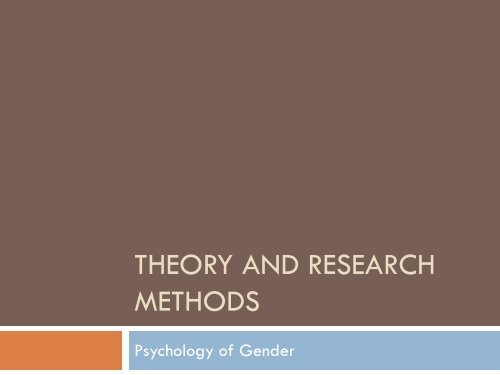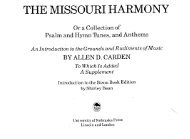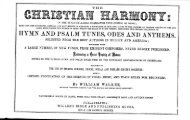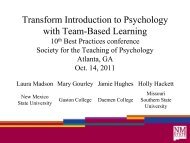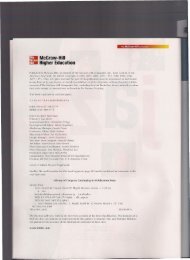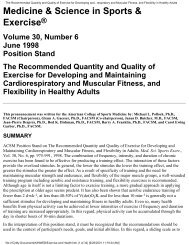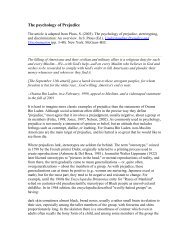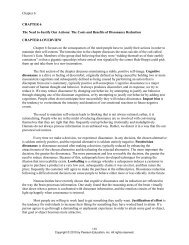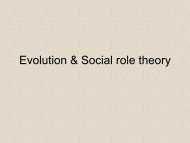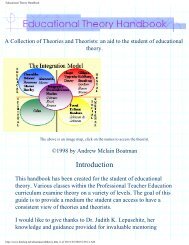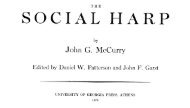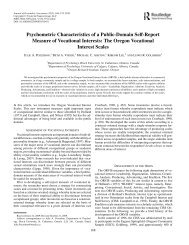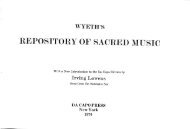Theory testing
Theory testing
Theory testing
You also want an ePaper? Increase the reach of your titles
YUMPU automatically turns print PDFs into web optimized ePapers that Google loves.
THEORY AND RESEARCH<br />
METHODS<br />
Psychology of Gender
Write your answers to the following on<br />
a sheet of paper. True or False<br />
1. Science is a collection of facts<br />
2. Hard sciences are more rigorous and scientific than<br />
soft sciences.<br />
3. Scientific ideas are absolute and unchanging.<br />
4. The job of a scientist is to find support for his or<br />
her hypothesis.<br />
5. Scientists are completely objective in their<br />
evaluation of scientific ideas.
Science isn’t just a collection of facts<br />
Falsification<br />
Determinism<br />
Parsimony<br />
Systematic observations/Empiricism<br />
Asks answerable questions<br />
Public knowledge<br />
Tentative conclusions<br />
Based on theories that can be refuted
Science is flawed: People are flawed<br />
People are not objective; they are biased<br />
Choice of study<br />
How it is studied<br />
Previous beliefs<br />
Expectations<br />
Information processing/How evidence is evaluated<br />
Motivational<br />
selective attention, selective recall, confirmation bias<br />
Desire for social consensus<br />
Illusory correlations and personal contact
Science is flawed:<br />
Research methods are flawed<br />
There is no such thing as the perfect research study<br />
Measurement<br />
Observation<br />
Hypotheses and predictions<br />
Inferences drawn from observations<br />
People do science<br />
Still, what’s the alternative?!
Ways of knowing/<br />
Reasons for holding a viewpoint or position<br />
Authority<br />
Anecdote<br />
Direct experience/<br />
observation<br />
Intuition<br />
Faith, inspiration,<br />
emotions, gut feelings<br />
Deduction<br />
Logic, reason<br />
Systematic observation<br />
(empiricism)<br />
+<br />
Logic/Reason<br />
=<br />
Scientific Method<br />
Which method is the most valid? The most convincing?
WHAT IS A THEORY?
Theories<br />
testable framework for describing the behavior of a<br />
related set of social phenomena<br />
capable of predicting (and often explaining or<br />
describing)<br />
and capable of being tested through experiment or<br />
otherwise falsified (disproved) through empirical<br />
methods.<br />
Theories do not equal hypotheses or guesses!
Hypotheses<br />
Specific prediction based on a theory<br />
a large number of more specific hypotheses may<br />
be logically bound together by just one or two<br />
theories
Heredity<br />
<strong>Theory</strong>:<br />
Evolution<br />
Natural<br />
Selection<br />
Variations<br />
Hypothesis (based on Natural selection):<br />
Fishes with red tails are really healthy, therefore<br />
Fishes with really red tails will get more sexual<br />
partners
Popper: Falsification<br />
Theories and hypothesis cannot be proved<br />
All swans are white<br />
Evolution<br />
Newton’s theory of relativity<br />
<strong>Theory</strong> <strong>Theory</strong><br />
Consistent result - Inconsistent result<br />
= ?? = -T
Theories<br />
Theories cannot be proved<br />
All swans are white<br />
The earth is flat (or round); the earth (or sun) is the center<br />
of the universe<br />
Evolution<br />
Newton’s theory of relativity<br />
Good theories have some things in common:<br />
Make unique predictions<br />
Overtime, converging evidence supports the theory<br />
The theory has not been refuted
Re-test. True or False<br />
1. Science is a collection of facts<br />
2. Hard sciences are more rigorous and scientific than<br />
soft sciences.<br />
3. Scientific ideas are absolute and unchanging.<br />
4. The job of a scientist is to find support for his or<br />
her hypothesis.<br />
5. Scientists are completely objective in their<br />
evaluation of scientific ideas.
Soft vs. Hard Sciences<br />
Psychological Science<br />
Describes, predicts, and explains<br />
Thoughts, emotions and behavior of people<br />
Testing theories in psychology<br />
How might you design experiments that investigate<br />
aggression?<br />
Redness of a fishes tail?
Operational Definitions<br />
To conduct a study you must decide how to measure<br />
variables<br />
Even if there are observable variables (hair color)<br />
there may be more than one way to measure it.<br />
E.g. learning, aggression, sexual competition, fishy tail<br />
redness<br />
Nerdiness: an observed variable<br />
Valid vs. invalid measure?<br />
Learning: unobservable variable<br />
Valid vs. invalid measure?
Methods in psychological science<br />
Generate Ideas<br />
Come up with a hypothesis drawn from a theory<br />
Come up with a theory<br />
Chose a research design<br />
Create an operational definition<br />
Collect data<br />
Analyze data<br />
Communicate results
Research Designs<br />
Observational<br />
May measure or simply describe phenomena<br />
Survey/Correlational<br />
Examine the relationship between two variable<br />
Often provide a correlation or may provide some prediction<br />
capability<br />
E.g., SAT scores and GPA<br />
Experimental<br />
Use random assignment to groups, manipulate a<br />
independent variable, measure a dependent variable, and<br />
control for extraneous factors<br />
Examine causal claims
Correlation versus causation<br />
Alcohol consumption and publication rate (success<br />
rates)<br />
Direction<br />
Strength<br />
Issues?
Correlation vs. causation<br />
How might an experiment test the alcohol and<br />
success rate hypothesis?
Gendered research<br />
How to introduce sexism into science:<br />
Collect data on only one sex<br />
Use research assistants of only one sex<br />
Make predictions about only one sex<br />
Without <strong>testing</strong> competing or alternative predictions


